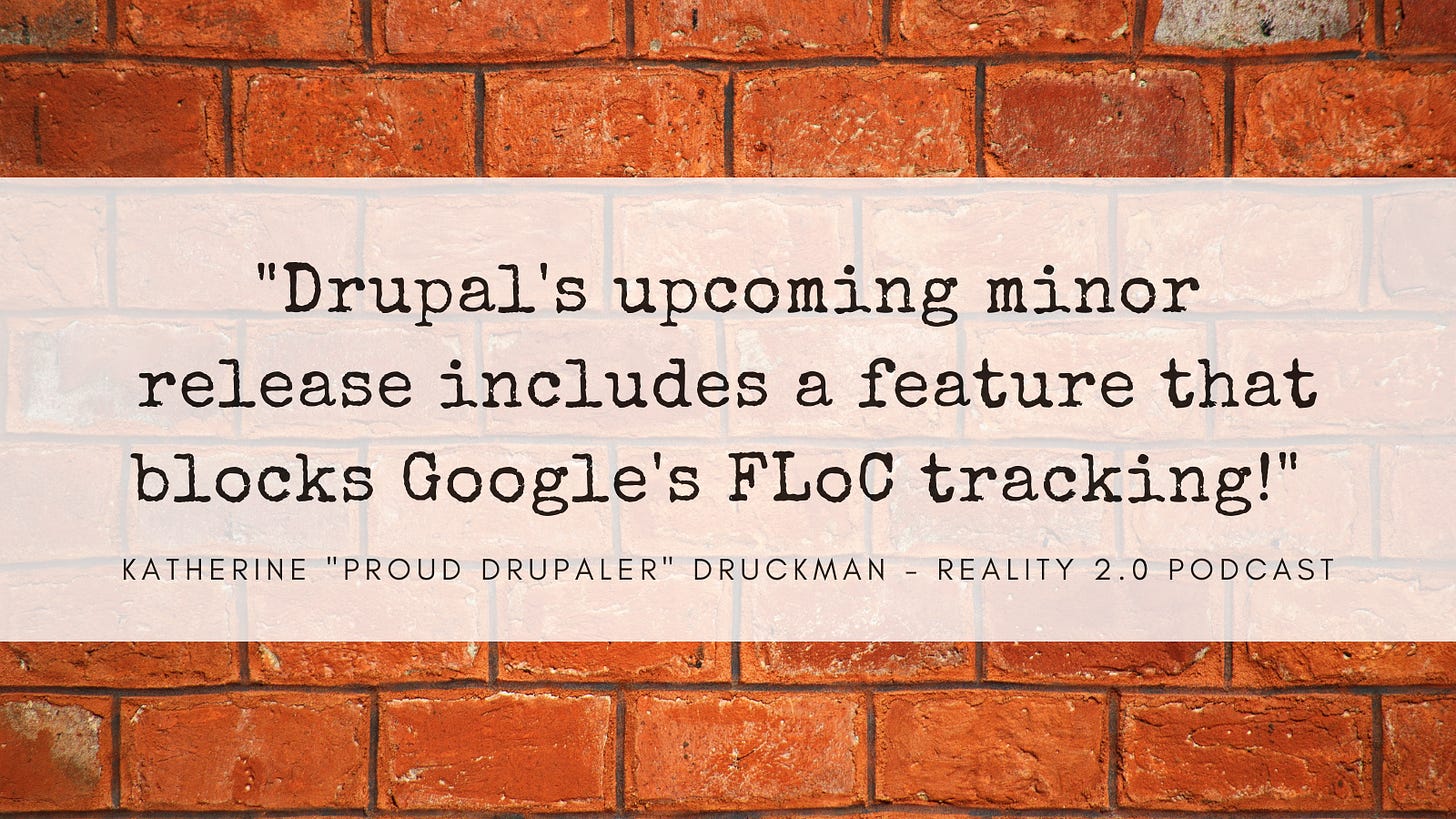To get this weekly dose of Reality delivered by email, sign up on our Substack page.
A Quick Plug
Episode 71: Tons of Tracking Tech
Katherine Druckman and Doc Searls talk about Apple’s IDFA, Ford In-Car ads, and more about AirTags.
Please remember to subscribe via the podcast player of your choice.
Drupal, WordPress, and Joomla Block Google’s FLoC Out of the Box
After a lengthy discussion in Drupal’s core issue queue by some of Katherine’s favorite people, the upcoming release of Drupal 9.2 will officially block Google’s Federated Learning of Cohorts (FLoC) by default! Similarly, the WordPress and Joomla communities are taking similar measures. With these platforms representing a huge chunk of websites, this must be quite a blow to Google, enough so that a member of Google Chrome’s developer relations team weighed in on the Drupal issue himself. I hope this news inspires you to run off and build a Drupal site, so I’ll just leave this documentation link here just in case.
We talked a bit about these decisions in last weeks episode, but barely scratched the surface, so it’s definitely worth exploring further. If anything strikes you about this or any other privacy-related issue, please reach out here in a comment, or on any of our social outlets, or via our contact form.
Site/Blog/Newsletter | Facebook | Twitter | YouTube | Mastodon
This Week’s Reading List
Ford Patented In-Car Ads Because We Live In Hell Now — I’m all for innovation in the automotive sector, but there are some technologies I simply cannot abide by, and Ford’s newly-patented billboard detector that can read ads and display them inside your car is exactly one of those technologies.
Apple forcing developers to ditch unique device IDs | Ars Technica — 2013 article about the origins of Apple's IDFA.
Proposal: Treat FLoC like a security concern – Make WordPress Core — Why is this bad? As the Electronic Frontier Foundation explains in their post “Google’s FLoC is a terrible idea“, placing people in groups based on their browsing habits is likely to facilitate employment, housing and other types of discrimination, as well as predatory targeting of unsophisticated consumers. This is in addition to the privacy concerns of tracking people and sharing their data, seemingly without informed consent – and making it more difficult for legislators and regulators to protect people.
Add Permissions-Policy header to block Google FLoC [#3209628] | Drupal.org — Google is introducing what it calls Federated Learning of Cohorts, which is a way to gather user data without cookies, regardless of whether a website is loading any Google-related trackers. This is enabled starting in Chrome 89, and only in select countries on a trial basis. Although other major browser vendors are likely against this technology and will presumably not be implementing it, given Chrome’s market share this will become a concerning issue, because it largely remove users’ ability to easily opt out of being tracked—particularly true in the case of less-savvy users. See a very informative post by Plausible. Since no one can reasonably expect users to just stop using Chrome, it will be up to responsible developers to block FLoC at the source.
Joomla! and FLoC — Federated Learning of Cohorts (FLoC) proposes a new way for businesses to reach people with relevant content and ads. We explore what this could mean and why we are giving you the choice as to whether to use it or not.
The Reality 2.0 Podcast explores how tech, privacy, and security impact reality in a post-COVID world. Subscribe now and don't miss a thing! We welcome your feedback at our contact page.

